Unit 2 Looking into the future Grammar-The Future Progressive Tense课件(共16张PPT)-2025-2026学年人教版(2019)选
文档属性
| 名称 | Unit 2 Looking into the future Grammar-The Future Progressive Tense课件(共16张PPT)-2025-2026学年人教版(2019)选 | 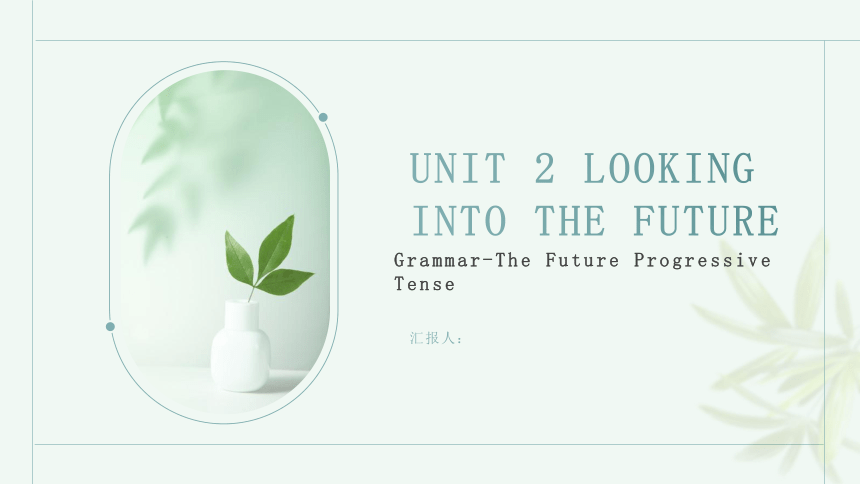 | |
| 格式 | pptx | ||
| 文件大小 | 937.9KB | ||
| 资源类型 | 教案 | ||
| 版本资源 | 人教版(2019) | ||
| 科目 | 英语 | ||
| 更新时间 | 2025-06-22 22:23:37 | ||
图片预览

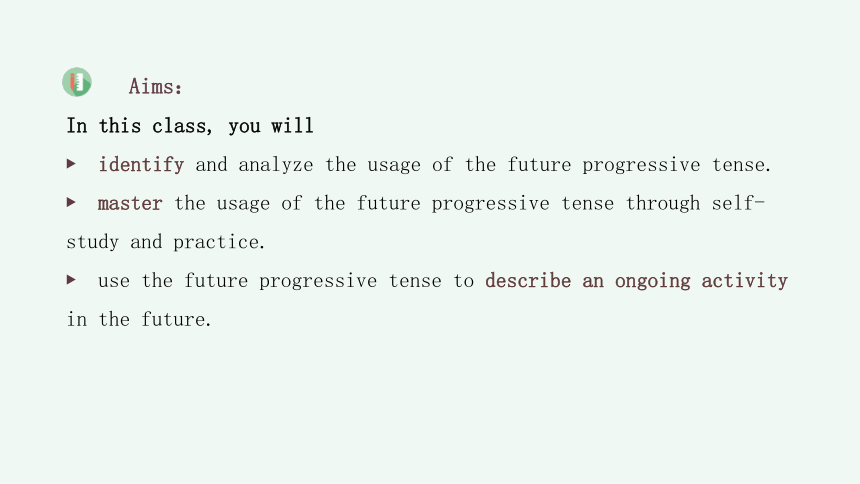
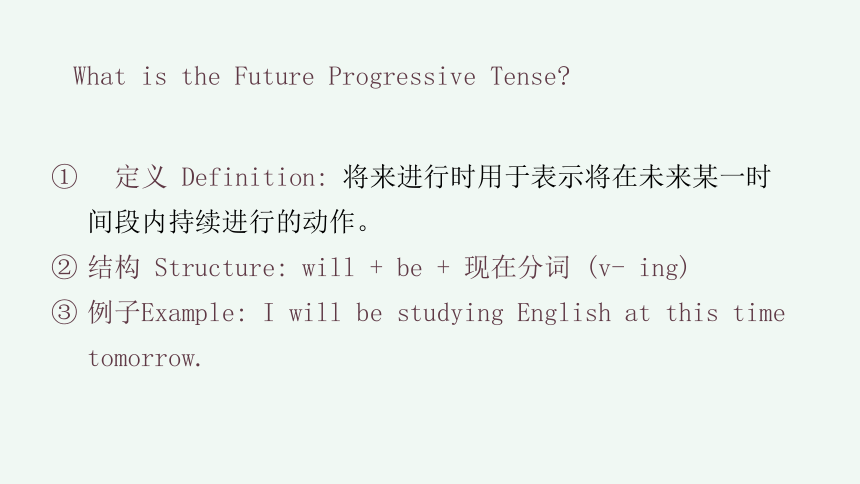
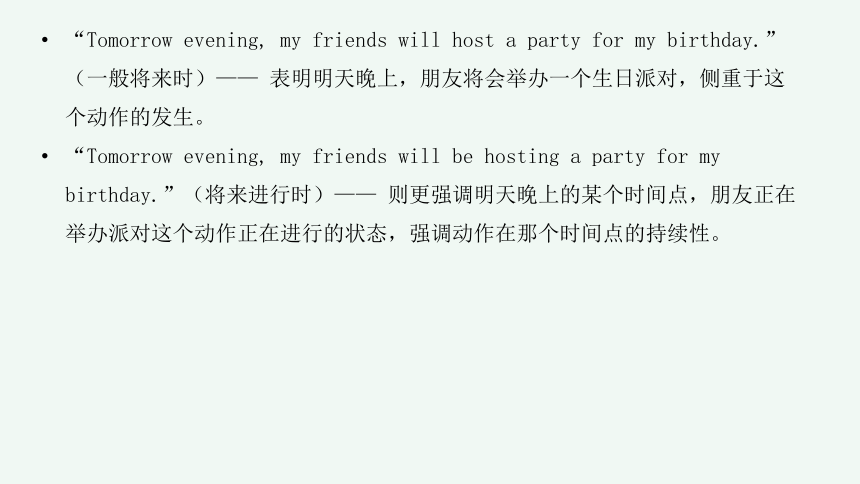
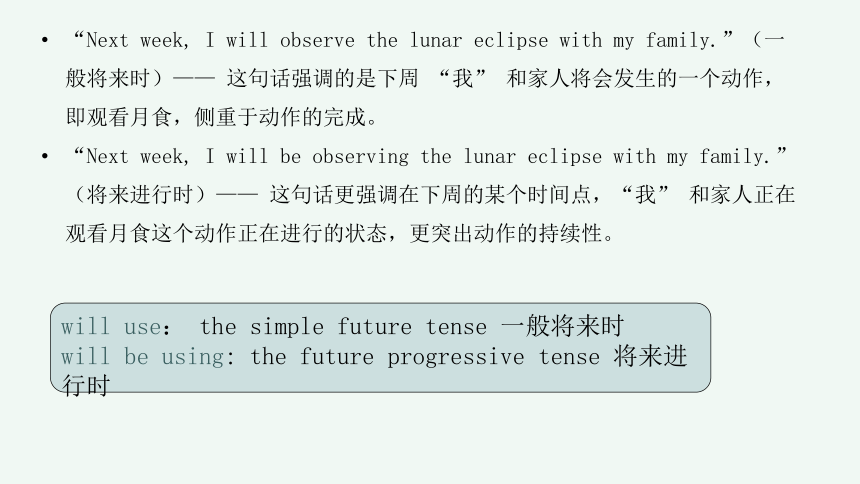
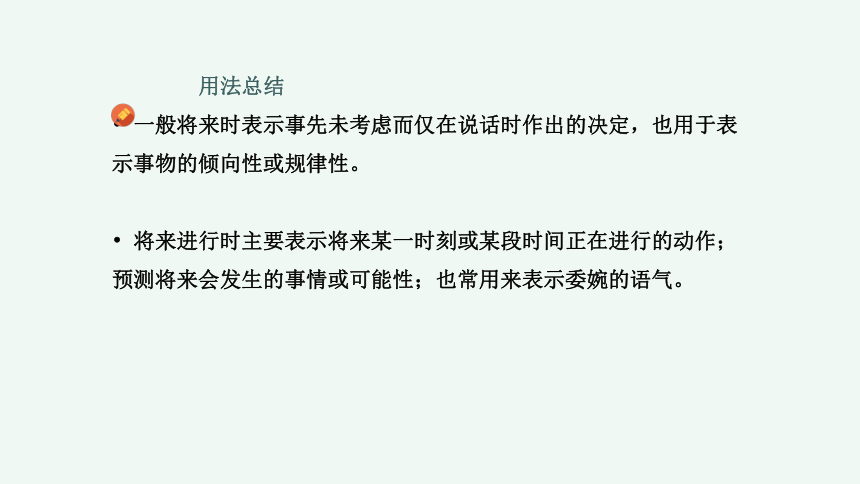
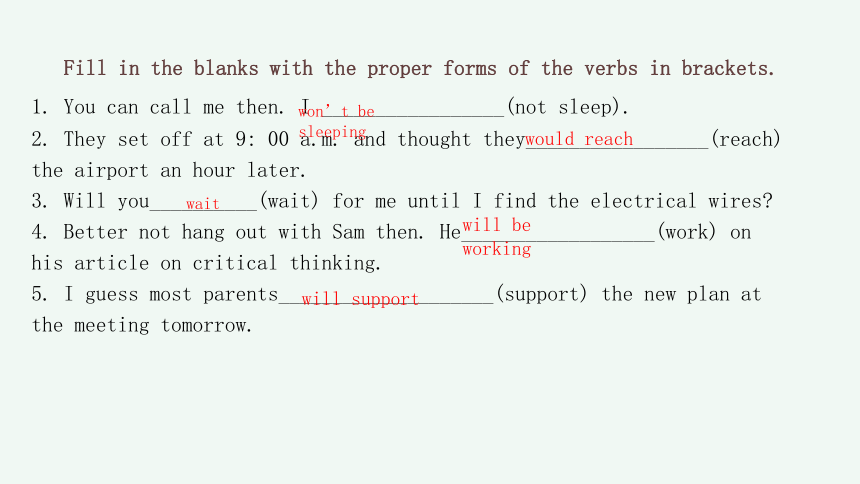
文档简介
(共16张PPT)
汇报人:
Grammar-The Future Progressive Tense
UNIT 2 LOOKING INTO THE FUTURE
Aims:
In this class, you will
identify and analyze the usage of the future progressive tense.
master the usage of the future progressive tense through self-study and practice.
use the future progressive tense to describe an ongoing activity in the future.
What is the Future Progressive Tense
定义 Definition: 将来进行时用于表示将在未来某一时间段内持续进行的动作。
结构 Structure: will + be + 现在分词 (v- ing)
例子Example: I will be studying English at this time tomorrow.
“Tomorrow evening, my friends will host a party for my birthday.”(一般将来时)—— 表明明天晚上,朋友将会举办一个生日派对,侧重于这个动作的发生。
“Tomorrow evening, my friends will be hosting a party for my birthday.”(将来进行时)—— 则更强调明天晚上的某个时间点,朋友正在举办派对这个动作正在进行的状态,强调动作在那个时间点的持续性。
“Next week, I will observe the lunar eclipse with my family.”(一般将来时)—— 这句话强调的是下周 “我” 和家人将会发生的一个动作,即观看月食,侧重于动作的完成。
“Next week, I will be observing the lunar eclipse with my family.”(将来进行时)—— 这句话更强调在下周的某个时间点,“我” 和家人正在观看月食这个动作正在进行的状态,更突出动作的持续性。
will use: the simple future tense 一般将来时
will be using: the future progressive tense 将来进行时
用法总结
一般将来时表示事先未考虑而仅在说话时作出的决定,也用于表示事物的倾向性或规律性。
将来进行时主要表示将来某一时刻或某段时间正在进行的动作;预测将来会发生的事情或可能性;也常用来表示委婉的语气。
Fill in the blanks with the proper forms of the verbs in brackets.
1. You can call me then. I _________________(not sleep).
2. They set off at 9: 00 a.m. and thought they_________________(reach) the airport an hour later.
3. Will you__________(wait) for me until I find the electrical wires
4. Better not hang out with Sam then. He__________________(work) on his article on critical thinking.
5. I guess most parents____________________(support) the new plan at the meeting tomorrow.
won’t be sleeping
would reach
wait
will be working
will support
用法总结
将来进行时可表达最近或较远的将来的某一时间正在进行的动作,如句子1
将来进行时可表示已计划好要做某事,如句子4。
句子3和句子5适合用一般将来时,表达一种主观意愿。
将来进行时表示将来时间里按照计划要做某事,语气上更委婉、更礼貌。
试比较:
When will you come to see us again (发出邀请,表示一种主观意愿)
When will you be coming to see us again (询问计划,语气更加委婉)
用法总结
将来进行时由“will + be + 现在分词”构成,如果主语为第一人称,偶尔用shall。以work 为例:
人称 示例
第一人称 We / I shall / will be working.
第二人称 You will be working.
第三人称 They/He/She / It will be working.
Task 3 Work in pairs to fill in the blanks
1.At 9 pm tomorrow evening, my mom __________________ (read) a book.
2.Next week, my friends __________________ (cook) dinner together every night.
3.Tomorrow morning, she __________________ (paint) the living room walls.
4.At noon tomorrow, he __________________ (work out) at the gym.
5.This weekend, I _______________ (clean) the garage.
will be reading
will be cooking
will be working out
will be reading
will be cleaning
6.On Monday morning, the Smiths _____________ (host) a small party at their house.
7.Next month, they _____________ (visit) several historical sites during their vacation.
8.Tomorrow afternoon, we _____________ (watch) the soccer match on TV.
9.Tomorrow night, my family _____________ (celebrate) my sister's graduation.
will be hosting
will be visiting
will be watching
will be celebrating
1. 当你想询问朋友明天下午3点是否在开会时,正确表达是:
A. Will you have a meeting at 3 p.m. tomorrow
B. Will you be having a meeting at 3 p.m. tomorrow
2. 描述“下周末我们将在海边度假”,应使用:
A. We will spend our holiday by the sea next weekend.
B. We will be spending our holiday by the sea next weekend.
Task 3 Work in pairs.
3. 表示“下个月她将一直在准备期末考试”,正确形式是:
A. She will prepare for the final exam next month.
B. She will be preparing for the final exam next month.
4. 询问“明天晚上7点你是否在做饭”时,正确的表达是:
A. Will you cook dinner at 7 p.m. tomorrow evening
B. Will you be cooking dinner at 7 p.m. tomorrow evening
5. 说“下周他们将在装修新房子”,应该选择:
A. They will decorate the new house next week.
B. They will be decorating the new house next week.
Task 3 Work in pairs.
Task 4 将下列句子改为将来进行时:
1. They will attend a conference in Beijing next week.
→ __________________________________________
2. The team will complete the project by the end of this month.
→ __________________________________________
3. I will visit my grandparents during the summer holiday.
→ __________________________________________
1. They will be attending a conference in Beijing next week.
2. The team will be completing the project by the end of this month.
holiday.
3. I will be visiting my grandparents during the summer holiday.
用法总结
将来进行时由“will + be + 现在分词”构成,主语为第一人称时偶尔用shall。
将来进行时可表达最近或较远将来某一时间正在进行的动作。
像现在进行时一样,可表示已计划好的事,尤其适用于旅行计划等。
有时用来委婉地提出请求或表达其他含义,语气比一般将来时更缓和。
汇报人:
THE END
汇报人:
Grammar-The Future Progressive Tense
UNIT 2 LOOKING INTO THE FUTURE
Aims:
In this class, you will
identify and analyze the usage of the future progressive tense.
master the usage of the future progressive tense through self-study and practice.
use the future progressive tense to describe an ongoing activity in the future.
What is the Future Progressive Tense
定义 Definition: 将来进行时用于表示将在未来某一时间段内持续进行的动作。
结构 Structure: will + be + 现在分词 (v- ing)
例子Example: I will be studying English at this time tomorrow.
“Tomorrow evening, my friends will host a party for my birthday.”(一般将来时)—— 表明明天晚上,朋友将会举办一个生日派对,侧重于这个动作的发生。
“Tomorrow evening, my friends will be hosting a party for my birthday.”(将来进行时)—— 则更强调明天晚上的某个时间点,朋友正在举办派对这个动作正在进行的状态,强调动作在那个时间点的持续性。
“Next week, I will observe the lunar eclipse with my family.”(一般将来时)—— 这句话强调的是下周 “我” 和家人将会发生的一个动作,即观看月食,侧重于动作的完成。
“Next week, I will be observing the lunar eclipse with my family.”(将来进行时)—— 这句话更强调在下周的某个时间点,“我” 和家人正在观看月食这个动作正在进行的状态,更突出动作的持续性。
will use: the simple future tense 一般将来时
will be using: the future progressive tense 将来进行时
用法总结
一般将来时表示事先未考虑而仅在说话时作出的决定,也用于表示事物的倾向性或规律性。
将来进行时主要表示将来某一时刻或某段时间正在进行的动作;预测将来会发生的事情或可能性;也常用来表示委婉的语气。
Fill in the blanks with the proper forms of the verbs in brackets.
1. You can call me then. I _________________(not sleep).
2. They set off at 9: 00 a.m. and thought they_________________(reach) the airport an hour later.
3. Will you__________(wait) for me until I find the electrical wires
4. Better not hang out with Sam then. He__________________(work) on his article on critical thinking.
5. I guess most parents____________________(support) the new plan at the meeting tomorrow.
won’t be sleeping
would reach
wait
will be working
will support
用法总结
将来进行时可表达最近或较远的将来的某一时间正在进行的动作,如句子1
将来进行时可表示已计划好要做某事,如句子4。
句子3和句子5适合用一般将来时,表达一种主观意愿。
将来进行时表示将来时间里按照计划要做某事,语气上更委婉、更礼貌。
试比较:
When will you come to see us again (发出邀请,表示一种主观意愿)
When will you be coming to see us again (询问计划,语气更加委婉)
用法总结
将来进行时由“will + be + 现在分词”构成,如果主语为第一人称,偶尔用shall。以work 为例:
人称 示例
第一人称 We / I shall / will be working.
第二人称 You will be working.
第三人称 They/He/She / It will be working.
Task 3 Work in pairs to fill in the blanks
1.At 9 pm tomorrow evening, my mom __________________ (read) a book.
2.Next week, my friends __________________ (cook) dinner together every night.
3.Tomorrow morning, she __________________ (paint) the living room walls.
4.At noon tomorrow, he __________________ (work out) at the gym.
5.This weekend, I _______________ (clean) the garage.
will be reading
will be cooking
will be working out
will be reading
will be cleaning
6.On Monday morning, the Smiths _____________ (host) a small party at their house.
7.Next month, they _____________ (visit) several historical sites during their vacation.
8.Tomorrow afternoon, we _____________ (watch) the soccer match on TV.
9.Tomorrow night, my family _____________ (celebrate) my sister's graduation.
will be hosting
will be visiting
will be watching
will be celebrating
1. 当你想询问朋友明天下午3点是否在开会时,正确表达是:
A. Will you have a meeting at 3 p.m. tomorrow
B. Will you be having a meeting at 3 p.m. tomorrow
2. 描述“下周末我们将在海边度假”,应使用:
A. We will spend our holiday by the sea next weekend.
B. We will be spending our holiday by the sea next weekend.
Task 3 Work in pairs.
3. 表示“下个月她将一直在准备期末考试”,正确形式是:
A. She will prepare for the final exam next month.
B. She will be preparing for the final exam next month.
4. 询问“明天晚上7点你是否在做饭”时,正确的表达是:
A. Will you cook dinner at 7 p.m. tomorrow evening
B. Will you be cooking dinner at 7 p.m. tomorrow evening
5. 说“下周他们将在装修新房子”,应该选择:
A. They will decorate the new house next week.
B. They will be decorating the new house next week.
Task 3 Work in pairs.
Task 4 将下列句子改为将来进行时:
1. They will attend a conference in Beijing next week.
→ __________________________________________
2. The team will complete the project by the end of this month.
→ __________________________________________
3. I will visit my grandparents during the summer holiday.
→ __________________________________________
1. They will be attending a conference in Beijing next week.
2. The team will be completing the project by the end of this month.
holiday.
3. I will be visiting my grandparents during the summer holiday.
用法总结
将来进行时由“will + be + 现在分词”构成,主语为第一人称时偶尔用shall。
将来进行时可表达最近或较远将来某一时间正在进行的动作。
像现在进行时一样,可表示已计划好的事,尤其适用于旅行计划等。
有时用来委婉地提出请求或表达其他含义,语气比一般将来时更缓和。
汇报人:
THE END
